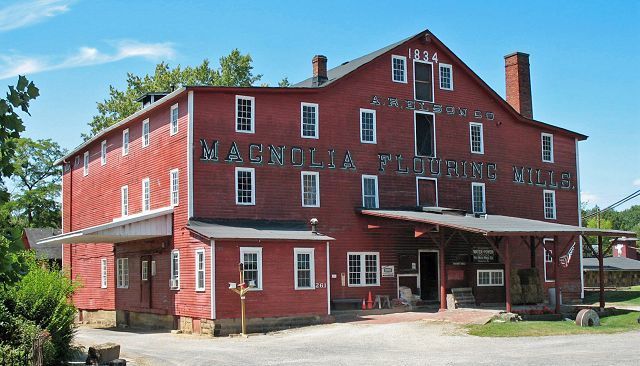The Magnolia Mill showcases innovation, transportation and community connections
Richard Elson of Virginia, founder of the village of Magnolia, built the Magnolia Flouring Mill, also known as the Elsons Flouring Mill, in 1834. Even today, the original hand-hewn beams, sandstone laid basement, nine over six double-hung windows and red lap siding are visible in the historic multistory building that has had numerous structural additions the over the years.
Augustus R. Elson, Richards son, took over operations of the mill in 1881. His three sons, Richard, John, and Frank, worked in the mill helping their father until 1920, when they assumed total responsibility for the mill. Electricity was added to the mill in 1940. Before that, the mill relied on a cast iron water mill manufactured by the Fitz Water Wheel Company of Hanover, Pennsylvania to provide power. Water sourced from the mills canal-fed pond powered the wheel. By 1947, Richards two children, Mack and Lorene Elson would become the owners of Magnolia Flouring Mills.
The success of the mill was due in part by its strategic location on the Sandy and Beaver Canal. The railroad ran through the town of Magnolia and its station was located behind the mill. With easy access to the two modes of transportation, the Magnolia Flouring Mill flourished along with the Sandy and Beaver Canal.
Today, the functioning Magnolia Flouring Mill operates as a feed mill. Corn meal, birdseed, animal feed, various seeds and farm products are available for purchase. Acquired by the Stark County Park District in 2005, the mill was added to the National Register of Historic Places in 2000.
The nearly five-acre property in downtown Magnolia still includes a segment of the Sandy and Beaver Canal behind the mill, the water rights for the canal and Dam #6. Located at the corner of Canal and Main Streets (Rt. 183), the location will eventually serve as a trailhead for the future Sandy and Beaver Canal Trail and the Pleasant Valley Trail that will connect Magnolia, Waynesburg, Malvern and Minerva.
Special tours are offered during the spring, summer and fall, including the upcoming free tour Thursday, June 26 from 6-7:15 p.m. The tour takes visitors inside the mill where they can learn more about the mills history, role in the community and the milling process.
July 7, 14, 21 and 28, the Magnolia Flouring Mill hosts Mondays in Magnolia. Guided tours of the mill begin at 2 p.m. Visitors are encouraged to explore the historic canal town afterwards.
The mill is open Monday, Tuesday, Thursday and Friday 8 a.m. to 4 p.m. and Saturdays until noon and closed Wednesdays and Sundays.
For more information, call 330-409-8096.

